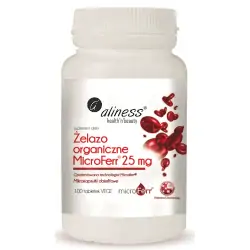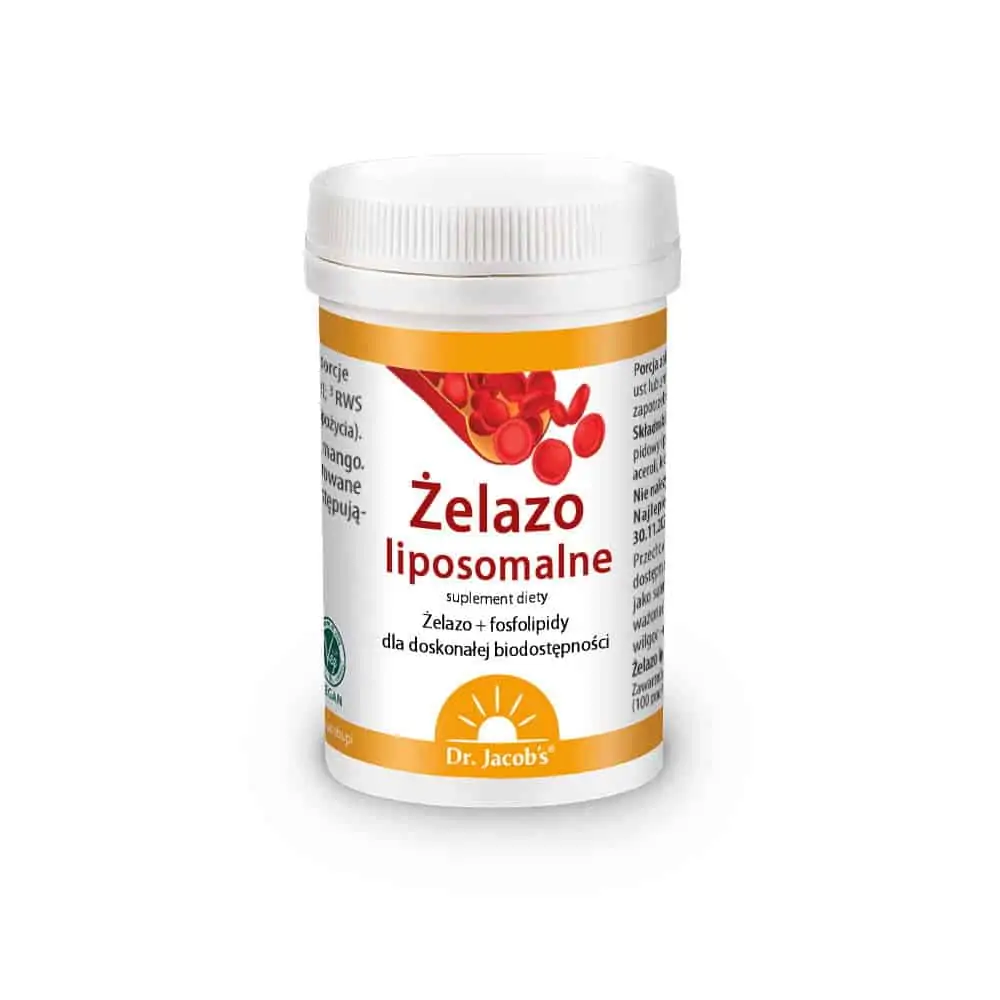


Ferritin test what is it?
- How to test ferritin levels?What does a ferritin test look like? The level of ferritin in the blood can be tested with a blood test. This test measures the amount of ferritin in the blood serum and is helpful in diagnosing diseases related to deficiency or excessive levels of iron in the body. No special preparation is needed before the ferritin test. Usually it is enough to be fasting for a few hours before the blood draw, but the doctor or medical personnel performing the test may recommend other instructions. It is worth noting that ferritin levels can be affected by many factors, such as liver disease, inflammatory diseases, pregnancy, anemia, as well as certain medications. Therefore, the result of a ferritin test should be interpreted by a doctor or specialist who will take into account the full clinical picture of the patient.
- What are the ferritin norms?
- Ferritin standards may vary slightly depending on the laboratory and the units of measurement used to measure it, but the following reference ranges are generally acceptedFor men 24-336 ng/mL (nanograms per milliliter)For women 11-307 ng/mLFor children 7-140 ng/mLIt is worth noting that ferritin standards may vary depending on the patient's age, gender, pregnancy and health status. The result of a ferritin test should always be interpreted by a doctor or specialist who will take into account the patient's full clinical picture. If the ferritin test result shows a deviation from normal, the doctor may recommend further testing to determine the cause and implement appropriate treatment.
- Iron deficiency and ferritin concentration
- Ferritin and iron deficiency are related because ferritin is the body's main iron storage protein. When the body's iron levels are low, ferritin stores it in the form of ferritin to ensure that iron is available when needed. Iron deficiency is one of the most common metabolic disorders worldwide, with symptoms including fatigue, pale skin, weakness, impaired concentration and feeling cold. Ferritin can be helpful in diagnosing iron deficiency because its level in the blood reflects the amount of iron stored in the body. Low levels of ferritin in the blood may indicate iron deficiency, while high levels of ferritin in the blood may suggest a disease associated with excessive iron, such as hemochromatosis. Treatment for iron deficiency may include dietary changes, iron supplementation and treatment of diseases that may cause iron deficiency. If blood ferritin levels are high, further diagnostic tests may be necessary, as well as medications or other therapies to reduce blood iron levels.
- Excess iron - effects
- Excess iron in the body, also known as hemochromatosis, is a disease that can lead to serious health consequences. The cause of excess iron is usually an abnormality in the process of regulating the amount of iron in the body, which leads to its excessive accumulation in tissues and organs. In addition, excess iron can lead to damage to tissues and organs, such as the liver, heart, pancreas and joints, which can lead to serious diseases such asLiver disease, including cirrhosis and hepatocellular carcinomaHeart disease, including ischemic heart disease, hypertension and arrhythmiasType 2 diabetesThyroid disordersArthritis and osteoarthritisEndocrine disordersExcess iron can be caused by inherited iron-accumulating diseases, such as genetic hemochromatosis, but can also result from long-term iron supplementation, blood transfusions or other factors. Treatment of excess iron depends on the cause and severity of the disease. It can include dietary changes, medications, blood therapy or medical procedures such as phlebotomy (removal of excess blood) or chelation therapy (removal of excess iron from the body with special drugs).
- Determination of ferritin levels, and iron
- The ferritin level is an important indicator of iron stores in the body, and its changes can indicate the presence of iron deficiency or excess. It can be said to reflect the degree of iron storage, and thus ferritin testing will show whether one is struggling with iron deficiency or excess. Low blood ferritin levels, which often accompany iron deficiency, can lead to iron deficiency symptoms such as fatigue, weakness, pale skin, impaired concentration and shortness of breath. Other symptoms of iron deficiency are also worth consulting a doctor. Testing ferritin levels is helpful in diagnosing iron deficiency and other iron storage diseases. Symptoms of excess ferritin (increased ferritin concentration), on the other hand, are observed in diseases associated with excessive iron storage, such as hemochromatosis. Decreased ferritin concentrations (low ferritin) indicate ferritin deficiency and may indicate iron deficiency, while elevated ferritin concentrations can lead to significantly reduced protein concentrations and cause serious health problems.
- Summary
- Ferritin is an iron storage protein that plays an important role in iron management in the body. Ferritin is a key indicator of the level of iron stores in the body, and changes in ferritin can indicate iron deficiencies or excesses. Low ferritin levels can lead to depletion of iron stores and iron deficiency, which affects the number of red blood cells in the body and leads to iron deficiency anemia. Elevated ferritin levels are associated with chronic liver disease and inflammation, as well as with excess iron found in hemochromatosis. High ferritin levels are associated with acute phase protein, which affects the easy release of iron from ferritin. The absorption of iron from food can be impaired in some conditions, leading to iron deficiency. High ferritin levels can also mask iron deficiency, making it difficult to diagnose iron deficiency. Therefore, ferritin is an important indicator of the body's iron stores and should be monitored along with blood iron levels.Supplements to support normal iron levels in the bodyALINESS Organic Iron MicroFerr 25 mg - 100 vegetarian tablets.
- DR. JACOBS Liposomal Iron (Vitality, immunity and cognitive function) 64g
- HEALTH LABS FeMe Complex (Iron Assimilation) 60 Capsules
- Take advantage of the discount
- Source
- Author
- Patryk Chodyniecki. Passionate about bodybuilding, swimming and combat sports. For more than 10 years he has been practicing amateur strength sports, which he likes to combine alternately with boxing, MMA and swimming. He is also interested in broadly defined supplementation and dietetics, which he successively
Ferritin is an iron storage protein found in humans, animals and some bacteria. Its main function is to bind and store iron in the body in a non-ionic form. Ferritin is present in many types of cells, including hepatocytes (liver cells) and macrophages (immune cells), where it stores iron in the form of ferritin so that it is available to the body when needed. Ferritin concentration in the blood is used as an indicator of the body's iron stores and can help diagnose iron deficiency or diseases associated with too much iron in the body, such as hemochromatosis or thalassemia. This is important because iron deficiency causes anemia and other diseases. The same is true for an excess of it. How to check a decrease in iron concentration using ferritin? Does a decrease in ferritin concentration indicate health problems? We write about it below!
How to test ferritin levels?
What does a ferritin test look like? The level of ferritin in the blood can be tested with a blood test. This test measures the amount of ferritin in the blood serum and is helpful in diagnosing diseases related to deficiency or excessive levels of iron in the body. No special preparation is needed before the ferritin test. Usually it is enough to be fasting for a few hours before the blood draw, but the doctor or medical personnel performing the test may recommend other instructions. It is worth noting that ferritin levels can be affected by many factors, such as liver disease, inflammatory diseases, pregnancy, anemia, as well as certain medications. Therefore, the result of a ferritin test should be interpreted by a doctor or specialist who will take into account the full clinical picture of the patient.
What are the ferritin norms?
Ferritin standards may vary slightly depending on the laboratory and the units of measurement used to measure it, but the following reference ranges are generally accepted:
For men: 24-336 ng/mL (nanograms per milliliter)
For women: 11-307 ng/mL
For children: 7-140 ng/mL
It is worth noting that ferritin standards may vary depending on the patient's age, gender, pregnancy and health status. The result of a ferritin test should always be interpreted by a doctor or specialist who will take into account the patient's full clinical picture. If the ferritin test result shows a deviation from normal, the doctor may recommend further testing to determine the cause and implement appropriate treatment.
Iron deficiency and ferritin concentration
Ferritin and iron deficiency are related because ferritin is the body's main iron storage protein. When the body's iron levels are low, ferritin stores it in the form of ferritin to ensure that iron is available when needed. Iron deficiency is one of the most common metabolic disorders worldwide, with symptoms including fatigue, pale skin, weakness, impaired concentration and feeling cold. Ferritin can be helpful in diagnosing iron deficiency because its level in the blood reflects the amount of iron stored in the body. Low levels of ferritin in the blood may indicate iron deficiency, while high levels of ferritin in the blood may suggest a disease associated with excessive iron, such as hemochromatosis. Treatment for iron deficiency may include dietary changes, iron supplementation and treatment of diseases that may cause iron deficiency. If blood ferritin levels are high, further diagnostic tests may be necessary, as well as medications or other therapies to reduce blood iron levels.
Excess iron - effects
Excess iron in the body, also known as hemochromatosis, is a disease that can lead to serious health consequences. The cause of excess iron is usually an abnormality in the process of regulating the amount of iron in the body, which leads to its excessive accumulation in tissues and organs. In addition, excess iron can lead to damage to tissues and organs, such as the liver, heart, pancreas and joints, which can lead to serious diseases such as:
Liver disease, including cirrhosis and hepatocellular carcinoma
Heart disease, including ischemic heart disease, hypertension and arrhythmias
Type 2 diabetes
Thyroid disorders
Arthritis and osteoarthritis
Endocrine disorders
Excess iron can be caused by inherited iron-accumulating diseases, such as genetic hemochromatosis, but can also result from long-term iron supplementation, blood transfusions or other factors. Treatment of excess iron depends on the cause and severity of the disease. It can include dietary changes, medications, blood therapy or medical procedures such as phlebotomy (removal of excess blood) or chelation therapy (removal of excess iron from the body with special drugs).
Determination of ferritin levels, and iron
The ferritin level is an important indicator of iron stores in the body, and its changes can indicate the presence of iron deficiency or excess. It can be said to reflect the degree of iron storage, and thus ferritin testing will show whether one is struggling with iron deficiency or excess. Low blood ferritin levels, which often accompany iron deficiency, can lead to iron deficiency symptoms such as fatigue, weakness, pale skin, impaired concentration and shortness of breath. Other symptoms of iron deficiency are also worth consulting a doctor. Testing ferritin levels is helpful in diagnosing iron deficiency and other iron storage diseases. Symptoms of excess ferritin (increased ferritin concentration), on the other hand, are observed in diseases associated with excessive iron storage, such as hemochromatosis. Decreased ferritin concentrations (low ferritin) indicate ferritin deficiency and may indicate iron deficiency, while elevated ferritin concentrations can lead to significantly reduced protein concentrations and cause serious health problems.
Summary
Ferritin is an iron storage protein that plays an important role in iron management in the body. Ferritin is a key indicator of the level of iron stores in the body, and changes in ferritin can indicate iron deficiencies or excesses. Low ferritin levels can lead to depletion of iron stores and iron deficiency, which affects the number of red blood cells in the body and leads to iron deficiency anemia. Elevated ferritin levels are associated with chronic liver disease and inflammation, as well as with excess iron found in hemochromatosis. High ferritin levels are associated with acute phase protein, which affects the easy release of iron from ferritin. The absorption of iron from food can be impaired in some conditions, leading to iron deficiency. High ferritin levels can also mask iron deficiency, making it difficult to diagnose iron deficiency. Therefore, ferritin is an important indicator of the body's iron stores and should be monitored along with blood iron levels.
Supplements to support normal iron levels in the body:
ALINESS Organic Iron MicroFerr 25 mg - 100 vegetarian tablets.
DR. JACOBS Liposomal Iron (Vitality, immunity and cognitive function) 64g
HEALTH LABS FeMe Complex (Iron Assimilation) 60 Capsules
Take advantage of the discount:
Source
-
https://www.healthline.com/health/ferritin
-
https://www.mayoclinic.org/tests-procedures/ferritin-test/about/pac-20384928
-
https://www.healthline.com/health/ferritin
Author:

Patryk Chodyniecki. Passionate about bodybuilding, swimming and combat sports. For more than 10 years he has been practicing amateur strength sports, which he likes to combine alternately with boxing, MMA and swimming. He is also interested in broadly defined supplementation and dietetics, which he successively
Rate the text






























